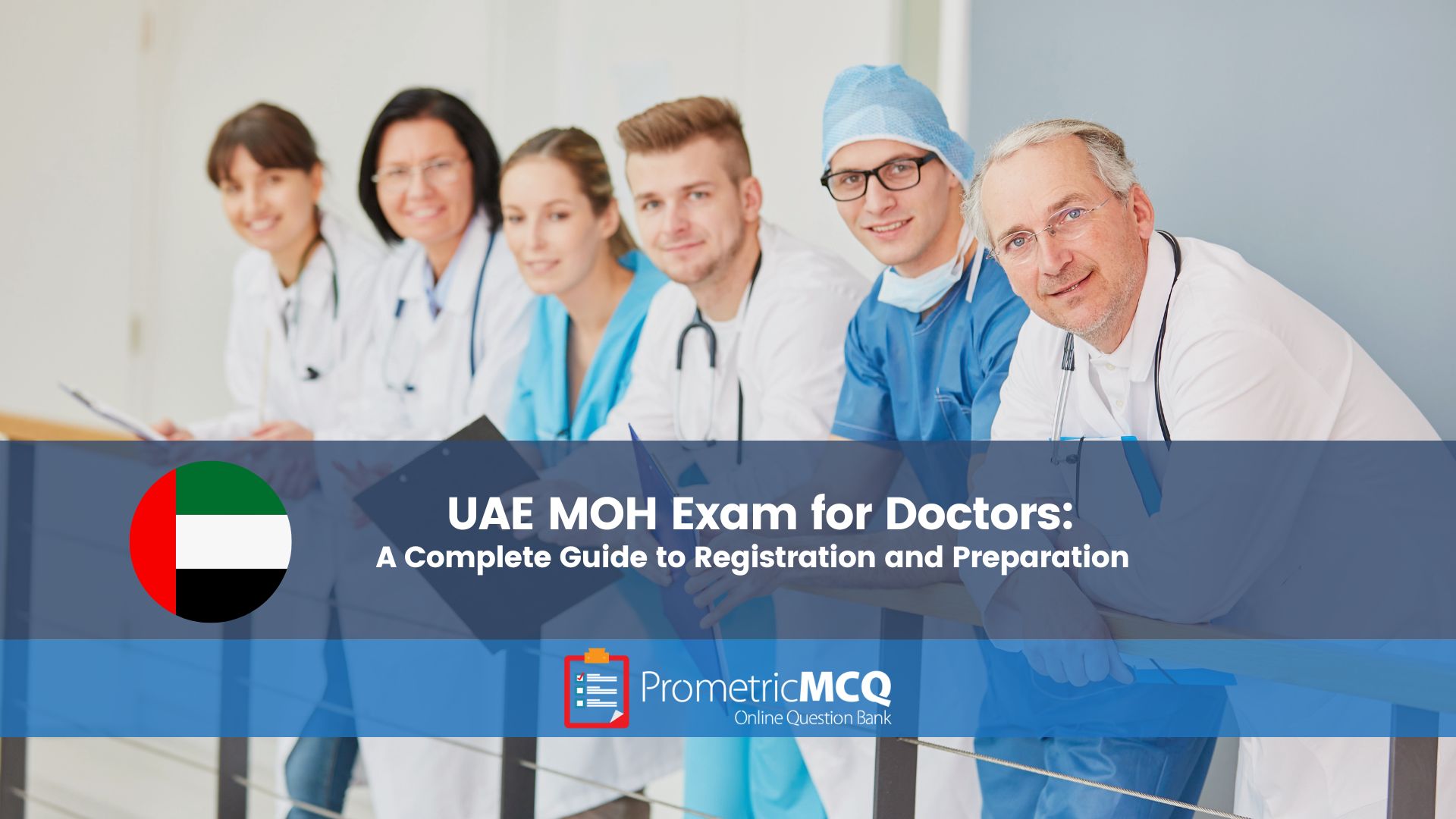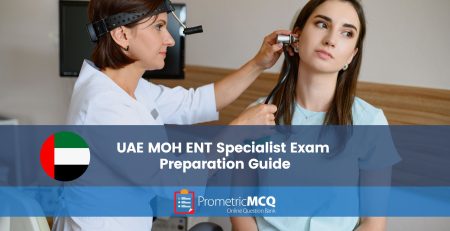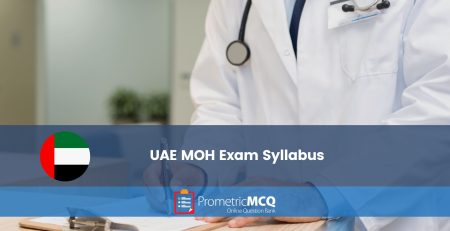
UAE MOH Exam for Doctors: A Complete Guide
Webmaster2025-01-07T07:36:20+00:00The UAE MOH Exam for Doctors, also known as the Ministry of Health Exam, is a mandatory examination for medical professionals who wish to practice in the United Arab Emirates. The exam is conducted by the Ministry of Health and is designed to assess the knowledge and skills of healthcare professionals in order to ensure that they meet the standards set by the UAE healthcare system.
The UAE MOH Exam for Doctors is of utmost importance for medical professionals in the UAE as it is a prerequisite for obtaining a license to practice medicine in the country. Without passing this exam, healthcare professionals are not allowed to work in hospitals, clinics, or any other healthcare facilities in the UAE. Therefore, it is crucial for medical professionals to prepare well and pass this exam in order to pursue their career in the UAE.
Are you a doctor aspiring to practice in the UAE? The MOH Exam for Doctors stands as a crucial gateway to realizing your medical career goals in this thriving healthcare landscape. Imagine the opportunities awaiting you in the vibrant healthcare sector of the UAE once you clear this essential examination. However, navigating the registration process and preparing effectively for the MOH Exam can be daunting tasks that often leave doctors feeling overwhelmed.
In our comprehensive guide, we will delve deep into the intricate process of registering for the UAE MOH Exam, equipping you with the necessary knowledge and strategies to tackle this milestone with confidence. From decoding the application procedure to outlining proven preparation techniques, we have curated actionable insights to streamline your journey towards MOH Exam for Doctors success.
Embark on this insightful exploration with us and unlock the keys to a successful MOH Exam for Doctors endeavor in the UAE. Let’s unravel the essential steps and invaluable tips to help you embark on this transformative journey seamlessly.
Table of Contents
ToggleIntroduction to UAE MOH Exam for Doctors
The registration process for the UAE MOH Exam for Doctors in the UAE is an essential step for doctors looking to practice medicine in the country. The Ministry of Health (MOH) oversees the registration and licensing of healthcare professionals to ensure the highest standards of healthcare delivery.
To begin the registration process, doctors need to submit the necessary documents and meet the eligibility requirements set by the MOH. These requirements may include holding a recognized medical degree, completing a certain number of years of clinical experience, and passing the MOH Exam for Doctors.
The MOH Exam serves as a comprehensive assessment of a doctor’s medical knowledge and competence. It evaluates their ability to provide safe and effective healthcare services to patients in the UAE. Passing the exam is crucial for obtaining a professional license to practice medicine in the country.
By going through the MOH License registration process, doctors gain credibility and recognition for their skills and expertise. It opens up new career opportunities and allows them to contribute to the healthcare system in the UAE.
In the following sections, we will delve deeper into the MOH Licensing registration process, eligibility requirements, and provide a step-by-step guide to help doctors navigate this important milestone in their medical career.
Gulf Countries Medical Professional License and MOH Prometric Exam Preparation
To practice medicine in the Gulf countries, doctors are required to obtain a valid medical professional license. This license serves as a testament to their expertise and ensures that they meet the region’s healthcare standards. One crucial aspect of obtaining this license is successfully passing the Prometric Exam.
The Prometric Exam is a standardized test designed to assess the knowledge and competency of medical professionals seeking to practice in Gulf countries. It covers a wide range of medical topics, including clinical skills, diagnostic procedures, and treatment protocols. The exam aims to ensure that healthcare providers meet the high standards set by the Gulf countries in delivering quality patient care.
Preparing for the Prometric Exam is essential for doctors aspiring to practice in the Gulf countries. It requires a comprehensive review of medical concepts and clinical guidelines. Studying from trusted and reliable sources is crucial to ensure accurate and up-to-date information.
In addition to academic preparation, it is important for doctors to familiarize themselves with the policies and regulations specific to each Gulf country. This includes understanding the licensing requirements, documentation needed, and any additional exams or interviews that may be necessary.
By successfully passing the Prometric Exam and obtaining the Gulf Countries Medical Professional License, doctors open up a world of opportunities in the field of medicine. They gain the credibility and recognition necessary to secure better career prospects and pursue their passion for providing healthcare in the Gulf countries.
Overall, thorough preparation and dedication are key to navigating the Prometric Exam and obtaining the necessary license to practice medicine in the Gulf countries. By investing time and effort into this process, doctors can confidently embark on a fulfilling and rewarding medical career in this region.
Introduction to UAE MOH Registration Process for Doctors
The registration process for the MOH Exam for Doctors in the UAE is a crucial step for doctors looking to practice medicine in the country. This process ensures that healthcare professionals meet the necessary requirements and possess the qualifications needed to provide quality care to patients. It is important for doctors to familiarize themselves with the step-by-step process to ensure a smooth registration experience.
Step 1: Eligibility Requirements
Doctors who wish to register for the MOH Exam for Doctors must meet certain eligibility criteria. These include holding a recognized medical degree, having a valid license from their home country, and possessing a minimum number of years of clinical experience. Additionally, doctors must provide proof of proficiency in the English language.
Step 2: Required Documentation
To complete the registration process, doctors need to gather and submit relevant documentation. This typically includes their medical degree certificate, valid passport, proof of clinical experience, and a good standing certificate from their previous employers. It is important to ensure that all documents are authentic and in the required format to avoid any delays or complications.
Step 3: Application Submission
Once all the necessary documents are gathered, doctors need to submit their application online through the UAE MOH website. The application should be filled out accurately and completely, providing all the required information. It is important to double-check the application before submission to avoid any errors or omissions.
Step 4: Document Verification
After the application is submitted, the UAE MOH will verify the provided documents. This process may take some time, and doctors should be prepared to provide additional documentation or clarification if requested. It is crucial to respond promptly to any communication from the MOH during this stage.
Step 5: Exam Registration and Scheduling
Once the documents are verified, doctors will receive instructions on how to register for the MOH Exam for Doctors. Registration typically involves paying an examination fee and selecting a convenient exam date and location. It is important to carefully review the exam syllabus and prepare accordingly.
Step 6: Exam and Interview
On the scheduled exam day, doctors will need to bring their identification documents and the necessary stationery to the examination center. The exam consists of multiple-choice questions designed to assess the knowledge and proficiency of doctors. After successfully passing the exam, doctors may be required to attend an interview to evaluate their clinical skills and competence.
By understanding and following this step-by-step process, doctors can navigate the UAE MOH registration process with confidence. It is important to note that the registration requirements and processes may be subject to change, so it is advisable to regularly check the official UAE MOH website for updates and guidelines.
Remember, MOH registration opens new doors of opportunities and enhances career prospects for doctors, enabling them to make a meaningful impact in the healthcare sector in the UAE.
Why is MOH Exam for Doctors Registration Necessary?
The MOH Exam for Doctors registration is essential for doctors looking to practice medicine in the UAE. It offers numerous benefits and plays a crucial role in an individual’s career as a healthcare professional. Here’s why registering with the MOH is necessary:
- Improved Career Prospects: The MOH registration opens up opportunities for doctors to work in a wide range of healthcare settings, including hospitals, clinics, and medical centers across the UAE. It enhances career prospects and provides access to a diverse patient population.
- Enhanced Credibility: Being registered with the MOH adds credibility and trustworthiness to a doctor’s professional profile. It assures patients that they are receiving care from a qualified and licensed medical practitioner.
- Compliance with Legal Requirements: Registering with the MOH ensures that doctors meet the legal requirements to practice medicine in the UAE. It demonstrates adherence to the country’s healthcare regulations and standards.
- Access to Continuing Medical Education: MOH registration allows doctors to participate in various training programs, conferences, and workshops. This enables them to stay updated with the latest medical advancements and enhance their knowledge and skills.
- Collaborative Opportunities: The MOH registration facilitates collaboration with other healthcare professionals, fostering a supportive network for knowledge sharing, research, and professional growth.
In conclusion, the MOH registration is necessary for doctors as it offers improved career prospects, credibility, compliance with legal requirements, access to continuing medical education, and collaborative opportunities within the healthcare industry.
Eligibility Requirements for MOH Exam Registration
To be eligible for the MOH Exam for Doctors in UAE and proceed with the registration process, doctors must meet specific qualification and professional requirements. Ensuring that you fulfill these criteria is essential for a smooth application process and successful registration.
Educational Qualifications
To apply for the MOH Exam for Doctors, doctors must have:
- A recognized medical degree: Candidates must hold a bachelor’s degree in medicine from a recognized university or institution.
- Proof of completion of internship: Doctors must have successfully completed their internship or house job, demonstrating practical experience in the medical field.
Professional Experience
In addition to educational qualifications, doctors also need a minimum amount of professional experience to be eligible for the MOH Exam for Doctors:
- General Practitioners (GPs): GPs should have at least two years of experience after completing their internship.
- Specialists: Specialists are required to have three years of clinical experience in their respective specialty after completing their internship.
- Consultants: Consultants need to have five years of clinical experience in their specialty after completing their internship.
Licensing and Good Standing
The candidates must also have the following credentials:
- Valid medical license: Doctors should possess a valid medical license from their home country or the country in which they currently practice.
- Good standing certificate: Doctors need to provide a good standing certificate from their current or previous medical regulatory authorities, confirming their professional conduct and absence of any disciplinary actions.
Meeting these eligibility requirements is crucial for a successful MOH registration process and an opportunity to advance your medical career in the UAE. Ensure that you have the necessary qualifications and documentation in place before beginning the registration process.
Remember, fulfilling the eligibility criteria not only demonstrates your expertise and professionalism but also enhances your chances of securing a reputable position and gaining trust from patients and colleagues in the UAE healthcare industry.
Step-by-Step Guide to MOH Registration Process
The MOH registration process in the UAE is a crucial step for doctors looking to practice medicine in the country. This comprehensive guide will take you through each step of the registration process, ensuring a smooth and successful journey.
Pre-Application
Before starting the MOH registration process, it’s important to ensure that you meet the eligibility requirements. These requirements include holding a recognized medical qualification, having a valid license from your home country, and possessing a minimum number of years of experience in your specialty.
Once you’ve confirmed your eligibility, you can begin the pre-application process. This involves gathering the necessary documentation, such as your academic certificates, professional licenses, and experience certificates. It’s essential to have these documents prepared and verified before proceeding to the next step.
Document Submission and Verification
Once you have your documents ready, you can submit them to the MOH for verification. This process usually involves submitting both physical copies and electronic copies of the required documents. The MOH will carefully verify the authenticity and validity of the submitted documents.
It’s important to ensure that all documents are accurately translated into Arabic, if required. Any discrepancies or missing information can cause delays in the registration process, so attention to detail is crucial.
Exam Requirements
After the document verification process, you will need to fulfill the exam requirements. The MOH Exam for Doctors is a standardized exam that evaluates your medical knowledge and skills. It’s essential to thoroughly prepare for this exam by studying relevant medical textbooks, attending review courses, and practicing sample questions.
The MOH Exam for Doctors covers various medical specialties, and the format may differ based on your specific specialization. Make sure to familiarize yourself with the exam format and content by referring to the official MOH website or seeking guidance from experienced medical professionals.
Interview Process
Once you have successfully cleared the MOH Exam for Doctors, the final step in the registration process is the interview. This interview is conducted to assess your suitability to practice medicine in the UAE. The interview panel may consist of experienced physicians and healthcare professionals.
Prepare for the interview by researching common interview questions, practicing your responses, and showcasing your passion for medicine and commitment to providing quality patient care.
By following this step-by-step guide, you can navigate the MOH registration process with confidence and increase your chances of success. Remember to stay organized, submit all required documents accurately, and dedicate sufficient time to exam preparation. Good luck on your journey toward becoming a registered medical professional in the UAE!
Common Challenges and How to Overcome Them
Navigating the MOH registration process can pose certain challenges for doctors. However, with the right strategies and approach, these obstacles can be overcome. Here are some common challenges doctors may face during the MOH registration process and practical tips to overcome them:
1. Understanding the Documentation Requirements
Challenge: The MOH registration requires doctors to submit various documents, and understanding the specific requirements can be confusing.
Tip: Familiarize yourself with the official MOH guidelines and checklist for document submission. Seek guidance from experienced colleagues who have successfully completed the registration process. Additionally, ensure that all your documents are complete, accurate, and properly attested.
2. Time Management
Challenge: Balancing the demands of work and the registration process can be overwhelming, leading to time constraints.
Tip: Create a schedule or timeline to manage your time efficiently. Prioritize the tasks related to the registration process, allocating specific periods for document gathering and verification, exam preparation, and interview preparation. Consider delegating some responsibilities, when possible, to lighten your workload.
3. Language Proficiency
Challenge: The MOH registration process requires doctors to demonstrate proficiency in the English language, including medical terminology.
Tip: Enhance your language skills by enrolling in language courses or workshops. Practice speaking and writing in English regularly to build your confidence. Utilize online resources and medical literature in English to familiarize yourself with medical terminology used in the exam.
4. Exam Preparation
Challenge: The MOH exam for Doctors is rigorous and requires thorough preparation.
Tip: Develop a study plan and allocate dedicated time for exam preparation. Utilize official MOH study materials and practice questions. Join study groups or online forums to engage with other candidates and exchange knowledge. Consider attending review courses or hiring a tutor if necessary.
5. Interview Performance
Challenge: The interview phase of the MOH registration can be nerve-wracking, as it requires effectively showcasing your skills and experience.
Tip: Prepare for the interview by researching common interview questions and practicing your responses. Reflect on your professional experiences and be ready to provide examples that highlight your expertise. Attend mock interviews or seek feedback from colleagues to improve your interview skills.
By acknowledging and proactively addressing these challenges, doctors can increase their chances of a smooth and successful MOH registration process. Remember, perseverance and a strategic approach are key to overcoming obstacles and achieving your goal.
Tips for a Smooth MOH Registration Process
Navigating the MOH registration process can be overwhelming, but with the right tips and insights, you can streamline the process and increase your chances of success. Here are some valuable pointers to help you:
- Research the Requirements: Familiarize yourself with the eligibility criteria and documentation needed for MOH registration. Ensure you meet all the necessary qualifications before starting the process.
- Prepare Your Documents: Gather all the required documents, such as your medical degree, experience certificates, and identification proof. Make sure they are complete, up-to-date, and in the required format.
- Submit Accurate Information: Fill out the registration form carefully, providing accurate information. Any discrepancies or errors may lead to delays or rejection of your application.
- Stay Organized: Keep all documents, receipts, and correspondence related to your MOH registration in one place. This will help you stay organized and easily track the progress of your application.
- Be Patient: The MOH registration process may take some time, so be patient and follow up regularly to ensure your application is being processed.
- Seek Guidance: If you encounter any difficulties or have questions during the registration process, don’t hesitate to seek guidance from the MOH helpline or consult professionals who have gone through the process before.
By following these tips, you can navigate the MOH registration process smoothly and increase your chances of success in pursuing your medical career in the UAE.
FAQs about UAE MOH Exam for Doctors Registration:
Here are some commonly asked questions about the MOH registration process in the UAE:
The MOH Exam for Doctors is a medical licensing examination conducted by the Ministry of Health (MOH) in various countries, particularly in the Middle East, like the United Arab Emirates (UAE). This exam is a mandatory requirement for doctors who wish to practice medicine in these countries.
Who needs to take it:
Foreign Trained Doctors: Medical professionals who have obtained their medical degrees from countries outside the one where they intend to practice. This is especially relevant for those seeking to work in the healthcare sector in the UAE or other Gulf Cooperation Council (GCC) countries.
Medical Specialists and General Practitioners: The exam is often differentiated based on the specialization and the level of practice, with separate exams for general practitioners, specialists, and consultants.
Doctors Seeking Licensure: Any medical doctor who wants to legally practice medicine within the jurisdiction of the MOH needs to clear this exam. It’s a key step in obtaining a professional license.
Doctors Pursuing a Career in Private or Public Healthcare Sector: Regardless of whether a doctor aims to work in a private clinic or a government hospital, passing the MOH Exam is essential for medical practice in these regions.
The MOH Exam for Doctors assesses the candidate’s medical knowledge, clinical skills, and aptitude to ensure they meet the healthcare standards of the region. The specific format and content of the exam can vary depending on the country and the medical specialty.
Applying for the UAE MOH Exam for Doctors involves a series of steps that need to be followed carefully. Here’s a general guide on how to apply:
Eligibility Check: Ensure that you meet the eligibility criteria for the MOH Exam. This typically includes having a recognized medical degree and fulfilling any specific requirements set by the UAE MOH.
Document Preparation: Gather all required documents. Commonly required documents include your medical degree certificate, a valid passport, a recent passport-sized photograph, a detailed CV, professional experience certificates, and any other certificates of your medical qualifications.
DataFlow Verification: Before applying for the exam, you need to go through the DataFlow process. This is a primary source verification process for your certificates and credentials. You can apply for DataFlow verification through the MOH website or the dedicated DataFlow portal.
Create an Account on the MOH Portal: Visit the UAE MOH’s official website and create an account. You will have to fill in your personal and professional details.
Exam Application: Once your account is created and your documents are verified through DataFlow, apply for the MOH Exam. Fill out the application form and choose your specialty.
Fee Payment: Pay the application and examination fees. These fees can vary, and it’s important to check the current fee structure on the MOH website.
Scheduling Your Exam: After your application is accepted, you will receive information on how to schedule your exam. The MOH exam is conducted at various centers and you can choose the one most convenient for you.
Prepare for the Exam: Start your preparation based on the syllabus and format of the MOH Exam. There are various resources available including books, online courses, and practice tests.
Attend the Exam: On the day of the exam, ensure you reach the test center with all required documents and IDs.
Awaiting Results: After taking the exam, you will need to wait for the results to be declared by the MOH.
Remember, each step may require time for processing and approval, so it’s advisable to start the application process well in advance of when you plan to take the exam. Also, keep checking the UAE MOH website for any updates or changes in the application process.
The eligibility criteria for the UAE Ministry of Health (MOH) Exam for Doctors are designed to ensure that candidates possess the necessary qualifications and experience to practice medicine in the UAE. Here are the key eligibility requirements:
Educational Qualification: Applicants must have a medical degree (MBBS, MD, or equivalent) from a recognized university or medical college. The degree should be attested, if obtained from a foreign university.
Professional Experience: The UAE MOH usually requires doctors to have a certain amount of post-graduation clinical experience. The required number of years can vary depending on whether you’re a general practitioner, specialist, or consultant. For instance, general practitioners might need two years of experience, whereas specialists could require more.
Good Standing Certificate: A certificate of good standing or a similar document from the medical council or board where you are currently licensed is often required. This certificate should not be older than six months.
DataFlow Verification: Successful primary source verification of your qualifications and professional credentials through DataFlow is mandatory. This process includes verification of educational degrees, professional licenses, and work experience.
Valid Passport: For international applicants, a valid passport is necessary for taking the exam and subsequent practice in the UAE.
Professional License: If you have previously practiced, evidence of licensure in your home country or the country of your last employment may be required.
It’s important to note that these criteria can be updated, and there might be additional specific requirements based on your medical specialty or changes in health authority policies.
Preparing effectively for the MOH (Ministry of Health) Exam for Doctors requires a structured approach, as the exam assesses both your theoretical knowledge and practical skills in medicine. Here are some strategies to help you prepare:
Understand the Exam Format and Syllabus: Familiarize yourself with the structure of the exam, including the types of questions (MCQs, OSCEs, etc.), subjects covered, and the syllabus. The MOH website or relevant authority can provide specific details.
Create a Study Plan: Develop a study schedule that covers all the topics in the syllabus. Allocate more time to subjects or areas where you feel less confident.
Use Recommended Textbooks and Resources: Refer to the recommended textbooks and study materials. Often, the examining body suggests specific resources that are aligned with the exam content.
Practice with Past Papers and Mock Tests: Practicing with previous exam papers and mock tests can give you a good idea of the exam format and the type of questions asked. It also helps in time management.
Join a Review Course: Consider enrolling in a review course specifically designed for the MOH Exam. These courses can provide structured learning, expert guidance, and peer interaction.
Focus on Clinical Skills: If the exam includes a practical or clinical component, ensure you are well-practiced in common procedures and patient interactions.
Stay Updated with Current Medical Practices: The field of medicine is continuously evolving, so it’s important to stay updated with the latest guidelines, treatments, and best practices.
Revise Regularly: Regular revision is key. Revisit each topic multiple times to ensure retention and understanding.
Time Management Skills: Practice managing your time efficiently, especially for multiple-choice questions and clinical scenarios.
Join Study Groups: Study groups can be beneficial for discussion, exchange of knowledge, and moral support.
Look After Your Health: A good preparation plan should also include taking care of your physical and mental health. Eat healthily, get enough sleep, and exercise regularly.
Simulate Exam Conditions: Occasionally, study under exam conditions (timed sessions, in a quiet environment) to build endurance and focus.
Seek Guidance from Peers or Mentors: Talk to colleagues or mentors who have already taken the exam for tips and advice.
Remember, consistency and perseverance are key in your preparation. It’s also essential to stay calm and confident as you approach the exam.
The format of the MOH (Ministry of Health) Exam for Doctors can vary depending on the country and the specific medical specialty. However, focusing on a general context, here’s an overview of the typical format:
Written Examination:
- The written part usually consists of Multiple Choice Questions (MCQs).
- These MCQs are designed to test the candidate’s knowledge in various medical fields relevant to their specialty.
- The questions might cover topics like diagnostics, clinical scenarios, treatment protocols, and medical ethics.
- The number of questions and the duration of the written exam can vary.
Practical Assessment (if applicable):
- In some specialties, there may also be a practical assessment.
- This could be in the form of an Objective Structured Clinical Examination (OSCE) where candidates are tested on their clinical skills, decision-making, and ability to handle real-life scenarios.
- The OSCE stations can include tasks like patient examination, interpretation of lab results, and response to emergency situations.
Oral Examination (in some cases):
- Certain specialties might require an oral examination where candidates are assessed through direct questions by a panel of examiners.
- The oral exam typically focuses on the candidate’s depth of knowledge, analytical skills, and approach to patient care.
It’s important to note that the specific format and content of the MOH Exam for Doctors can be different in each country and may also vary between different medical specialties. Therefore, it is advisable for candidates to check the exact format and requirements for their particular specialty and location by consulting the official MOH website or contacting the relevant MOH authority.
Passing the MOH (Ministry of Health) Exam for Doctors opens up a variety of career opportunities, particularly in the countries where this certification is recognized, such as in the Middle East. Here are some of the key opportunities that become accessible:
Working in Government Hospitals: One of the primary opportunities is working in public sector healthcare facilities. The MOH exam is often a prerequisite for employment in government hospitals and clinics.
Private Healthcare Sector: Doctors can also pursue careers in private hospitals, clinics, and healthcare centers. The MOH license is widely recognized and respected in the private sector.
Specialist Positions: For those who have specialized in particular fields of medicine, the MOH certification allows them to practice as specialists in their chosen area, be it cardiology, pediatrics, orthopedics, etc.
Consultancy Roles: Experienced doctors can work as consultants, providing expert advice in their field of specialization. This can include working in hospitals or setting up a private consultancy practice.
Teaching and Academia: With the MOH license, doctors can pursue academic careers, teaching in medical colleges and universities. They can also be involved in research and development in the medical field.
Healthcare Administration: Doctors can also move into administrative and managerial roles within healthcare facilities, contributing to healthcare policy, management, and operational efficiency.
Community Health Services: Opportunities exist in community health centers and services, where doctors can work in more community-focused healthcare, often dealing with public health issues.
Freelance Medical Practice: Some regions may allow doctors to set up their own private practice, providing healthcare services independently or in association with other healthcare professionals.
International Career Opportunities: Having an MOH certification can also be beneficial for doctors seeking to work internationally, particularly in regions that recognize this qualification.
Telemedicine and Digital Health Services: Doctors can also explore opportunities in the growing field of telemedicine and digital health services, providing medical consultation and services via digital platforms.
Remember, the specific opportunities can vary depending on the region and the healthcare system’s regulations. It’s always a good idea to explore the local job market and understand the demand and trends in the healthcare sector of the particular country.
Apply for UAE MOH License
Get UAE MOH Prometric Exam Preparation and Licensing Services










